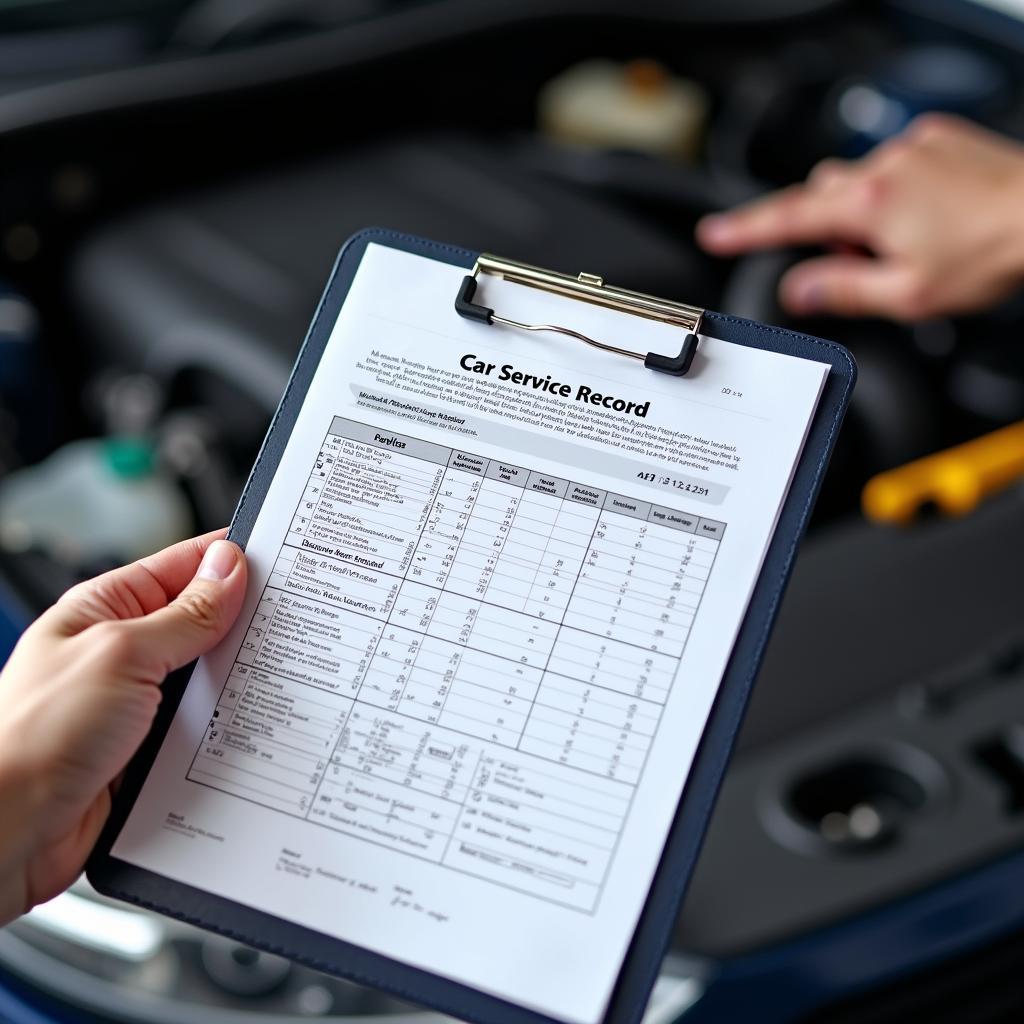Knowing the service history of a car is essential when buying a used vehicle or even just to keep track of your own car maintenance. It gives you valuable insights into the car’s past, helps you avoid potential problems, and can save you money in the long run. But how do you go about getting this information? This comprehensive guide will walk you through the ins and outs of obtaining a car’s service history.
Why is a Car’s Service History So Important?
Think of a car’s service history as its medical record. Just like your medical history tells doctors about your past health, a car’s service history reveals its past treatments, potential issues, and overall condition.
Here’s why having access to this information is crucial:
- Reveals potential problems: A detailed history can uncover hidden issues or recurring problems that might not be immediately obvious during a test drive.
- Verifies mileage: A consistent service history helps verify the car’s mileage and ensures it hasn’t been tampered with.
- Assesses maintenance quality: Regular and documented service from reputable mechanics can indicate a well-maintained car.
- Helps negotiate a fair price: Having a comprehensive history gives you leverage when negotiating the price, especially if the car has been meticulously maintained.
Where to Find a Car’s Service History
There are several avenues you can explore to obtain a car’s service history.
1. Check the Vehicle’s Owner’s Manual and Documents
The first and easiest place to check is the owner’s manual and any accompanying documents that came with the vehicle. Look for service records, receipts, and any other paperwork that indicates past maintenance or repairs.
2. Contact Previous Owners
If you’re buying a used car, try to obtain contact information for previous owners from the seller or through a vehicle history report (more on that below). Previous owners can often provide valuable insights into the car’s maintenance history.
3. Visit Dealerships and Mechanics
Dealerships and mechanics often keep electronic or physical records of the vehicles they have serviced. If you know where the car was previously serviced, reach out to them with the VIN (Vehicle Identification Number) to request access to the records.
4. Utilize Online Vehicle History Reports
Several reputable online services offer comprehensive vehicle history reports for a fee. These reports often include detailed service records, title information, accident history, and more.
Some popular options include:
- Carfax
- AutoCheck
- VINCheck.info
5. Explore Manufacturer Databases
Some car manufacturers maintain online databases where you can access service records by entering the VIN. Check your manufacturer’s website or contact their customer service to inquire about this option.
What to Look for in a Service History
Once you have the service history in hand, it’s essential to know what to look for.
- Regular Maintenance: Look for evidence of regular oil changes, tire rotations, brake inspections, and other routine maintenance tasks.
- Major Repairs: Check for any significant repairs or replacements, such as engine work, transmission service, or suspension repairs.
- Recalls and Service Bulletins: Ensure any recalls or service bulletins issued for the vehicle have been addressed.
- Consistency: Look for consistency in the service records. A well-documented history with regular entries from reputable mechanics is a good sign.
What if the Service History is Incomplete or Unavailable?
Don’t panic if the car you’re interested in has an incomplete or unavailable service history. While it’s not ideal, you can still take some steps to assess its condition:
- Get a Pre-Purchase Inspection: Have a trusted mechanic perform a thorough pre-purchase inspection. This comprehensive inspection can uncover any hidden issues and give you a better understanding of the car’s overall condition.
- Look for Red Flags: Be extra vigilant during the test drive. Pay attention to any unusual noises, vibrations, or warning lights.
- Negotiate Accordingly: If you decide to proceed with a car that lacks a complete service history, use this information to negotiate a lower price.
Conclusion
Getting a car’s service history is an essential step in the car buying process. It arms you with valuable information to make informed decisions, avoid potential problems, and potentially save money. By following the steps outlined in this guide, you can gain valuable insights into a car’s past and make a confident purchase. For further information on car maintenance and servicing, check out our articles on what is included in a full car service, when should you get your car serviced, and what are key things included in car servicing.
Remember, a car with a well-documented service history is more likely to be a reliable and safe investment.

